Introduction
Historic tensions in Israel and Palestine have again escalated to horrific violence. Following coordinated attacks by Hamas militants on October 7 that killed over 1400 people, including hundreds of civilian targets, the Israeli government responded with consistent airstrikes on Gaza, potentially killing over 8,000 people to date. Despite the escalating tensions, Canadian leadership remains committed to a two-state solution for Israel and Palestine and the promise to fund humanitarian aid in Israel, the West Bank, and Gaza.
Opportunistic far-right extremists in Canada have used news of the war to expose new audiences to tropes that dehumanise Muslims and portray Jews as powerful and all-controlling. Additionally, Canadian far-right extremists have weaponised anxiety about the situation, pushing the idea that global racial tensions are escalating as a justification for white nationalist activism. In particular, the crisis has created the perfect situation for neo-Nazi accelerationists: A rapidly escalating, deadly conflict in which they see neither side as ‘white’. This allows them to exploit death and destruction in Gaza to promote narratives of societal collapse without offending their audiences who, at best, consider the deaths of white people to be of higher importance, and at worst actively celebrate the deaths of non-white people.
This Insight will outline how Canadian far-right extremists are capitalising on deaths in Palestine and Israel to spread Islamophobic and antisemitic rhetoric, and ultimately to promote their own movements.
Promoting Antisemitism and Islamophobia
Israel and Palestine have been, and continue to be, contested topics in the global far-right. While transnational alt-right and ‘alt-light’ activists responsible for successfully mainstreaming white nationalism like Richard Spencer and Tommy Robinson have been ostensibly supportive of Israel in the past, more extreme far-right activists are often critical of this position. For example, since the start of the conflict, Canadian white supremacist Jeremy Mackenzie has attacked Tommy Robinson as “a loud and proud zionist [sic]” who “focused of the Islamic terror threat rather than the root of the problem,” which he identified in the same social media post as “zionism and Jewish power [sic].”
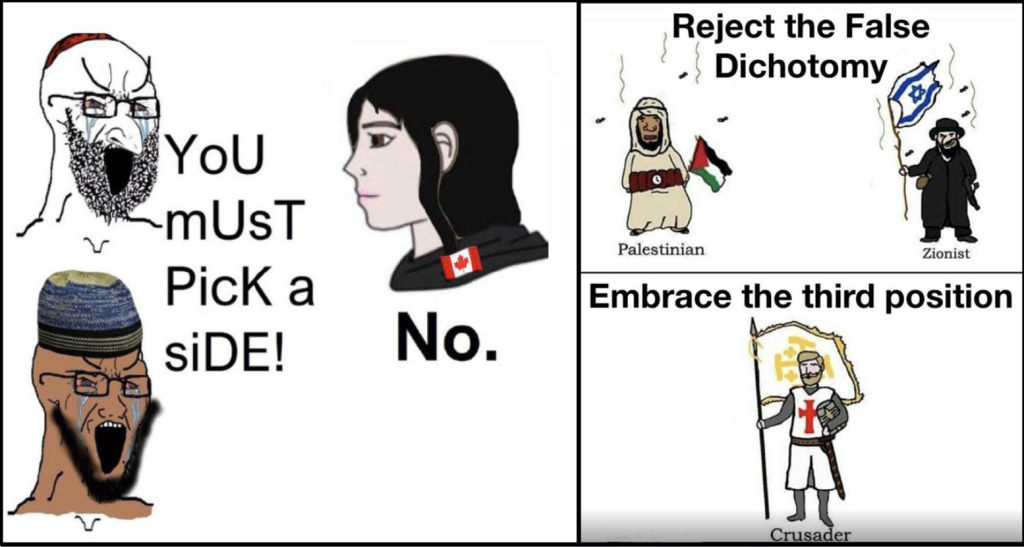
Fig. 1: Memes posted to a Canadian white nationalist’s Telegram page.
Canadian media personalities in less extreme far-right movements such as Lauren Southern and Gavin McInnes have made social media posts criticising Israel that do not ostensibly appear antisemitic, while simultaneously defending or promoting Islamophobia. Southern commented on the conflict to defend her past activism as “calling out Islamic extremism,” while McInnes used the opportunity to share memes mocking queer Palestinians (Fig. 2). Meanwhile, right-wing media outlets Rebel News and True North Centre for Public Policy have published content criticising pro-Palestine activism in defence of Israel, with Rebel News categorising some pro-Palestine activism in Canada as being “in favour of Hamas.”
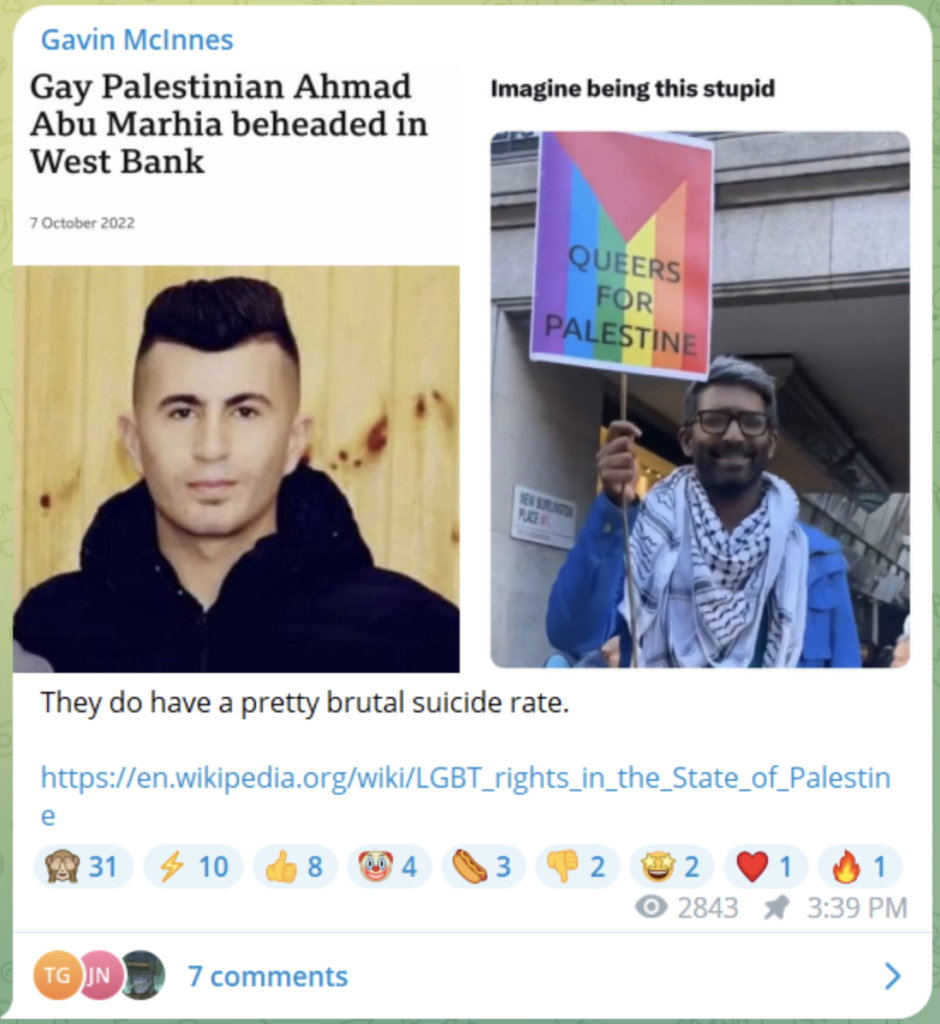
Fig. 2: Meme about ‘Queers for Palestine’ shared by Canadian far-right media personality Gavin McInnes.
Specific instances in which far-right extremists voice support for Israel or Palestine are often transparently insincere. American white supremacist Nick Fuentes, whose movement has orchestrated antisemitic publicity stunts accusing Israel of causing 9/11, outlined this clearly after the start of the war when he said that he didn’t care “that much” about Palestine. Instead, Fuentes clarified that his interest in the conflict was that it had “severe consequences for our adversaries (Israel).”
The far-right in Canada have aired similar indifference and even outright hostility towards Palestinians. Canadian neo-Nazi Brandon Martinez warned that the conflict could lead to sympathy for Palestinian refugees, saying “the leftists are going to weaponize any non-White conflict zone to flood us,” and that Muslims were “on Team Islam united against us.” He later proposed “the solution to the Israel/Palestine conflict” was to “let them kill each other while we watch from the sidelines” (Fig. 3). Similarly, one influential Canadian white supremacist livestreamer has affirmed that, despite his criticisms of Israel’s actions in the war, Europeans should take in “zero” refugees from Gaza.
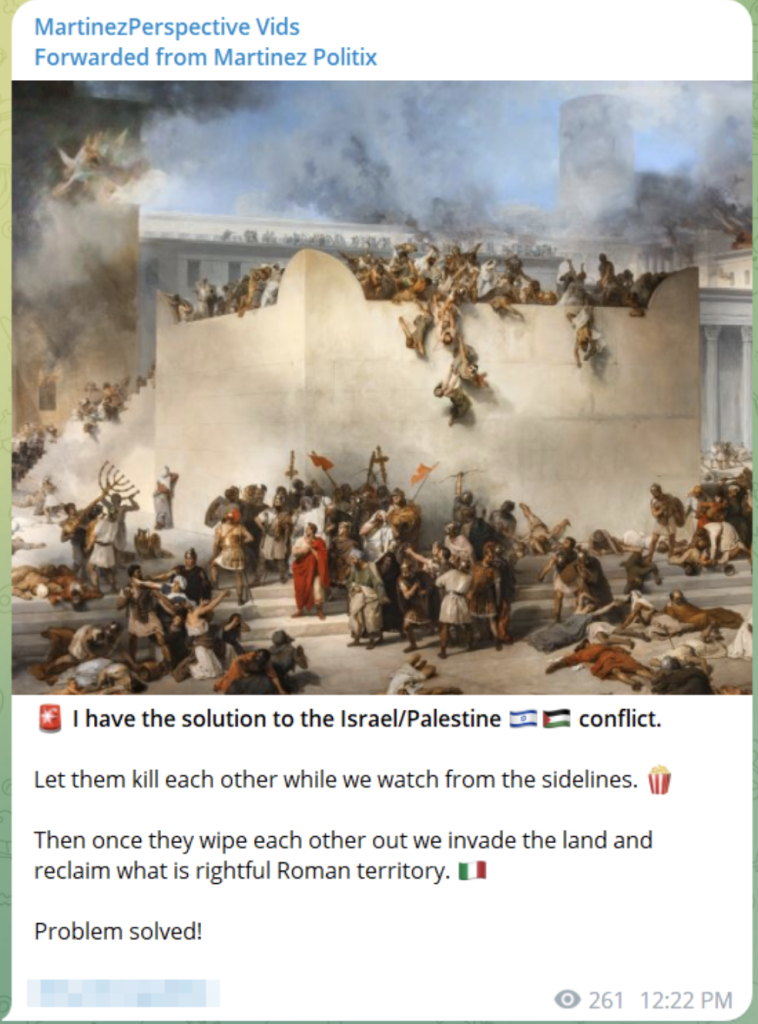
Fig. 3: Telegram post from neo-Nazi livestreamer Brandon Martinez.
Users of one of Canada’s most popular far-right forums have filled comment sections about Palestine with Islamophobia and xenophobic racism towards Palestinians. In response to the city of Edmonton, Alberta lighting a bridge with the colours of Palestine’s flag, one user encouraged Palestine supporters to jump off the bridge, joking that “Anti-Suicide Fence Panels will be removed, enabling you to show your support for Achmed and friends by taking a giant leap for a great humanitarian cause.” Another user attacked Palestinians by claiming “Palestinians will throw you (a queer woman) off a roof.” One reply said this meant that “there is some good in Palestine.”
One narrative among Christian white nationalists in Canada is that Christians are also victims of the crisis in Gaza, a war manufactured by Zionist-Occupied Governments (ZOG) – a neo-Nazi term for world governments believed to be secretly controlled by Jews. A Canadian military veteran and livestreamer with the far-right group Veterans 4 Freedom, who said he had “the unfortunate privilege of being involved in previous ZOG wars,” implied that the deadly explosion at the Al Ahli Baptist Hospital in Gaza on 16 October should – despite Gaza’s overwhelmingly Muslim population – be a wake-up call to Zionist Christians because the hospital was “Christian-run”. The streamer referred to the culprits as “the Synagogue of Satan [an antisemitic term for Jews], the old ZOG crew.” At the time of writing, the source of the hospital blast is still disputed by expert investigators.
In the same livestream, a notable Canadian white nationalist claimed that Israel was secretly funding “both sides” of the conflict, and used the story of the Al Ahli Hospital explosion to argue that Christians, not Jews, should have the right to Israel, as Jews were not truly God’s “chosen people”. The stream eventually devolved into Islamophobic rhetoric, citing Google-translated interpretations of the Quran to claim that Muslims and Jews “both want us dead at the end of the day.” Messaging encouraging extreme contempt for people requiring refuge is especially worrying in Canada, a country whose population growth was roughly 75% due to immigration in 2022.
Weaponising Canadian’s Anxiety
Prominent Canadian white supremacist Jeremy ‘Raging Dissident’ Mackenzie has framed the conflict as a reason for white nationalists to unite both against Jewish powers and immigrants. In a social media post in which he called for his audience to “tribe up,” Mackenzie warned his viewers that “a storm of anti-white revenge hysteria is brewing” from what he referred to as “our new ‘bipoc’ arrivals.” Mackenzie, the de-facto leader of the militant accelerationist network Diagolon, has told followers in previous years to “accelerate” in preparation for a race war.
Popular livestreamers and activists in the Diagolon movement have alternated between posting messages teetering on sympathy for Palestinian civilians killed in the war by the Israeli military, who Mackenzie has referred to as “bloodthirsty jew supremacists [sic],” and sharing content lamenting the possibility of Palestinians immigrating to countries with majority white populations. On social media, Mackenzie shared posts complaining about how “Arabs/Muslims are being brought into the US by Jewish Family Services” and accusing immigrants to the United Kingdom of “systematic rape, murder, assault and torture of Our [sic] men, women, and children.” Alex ‘Ferryman’ Vriend, another prominent figure of the Diagolon movement, criticised governments for accepting Muslim immigrants who “kill and rape Europeans” but not Muslims who “say something mean about Jews” (Fig. 4).
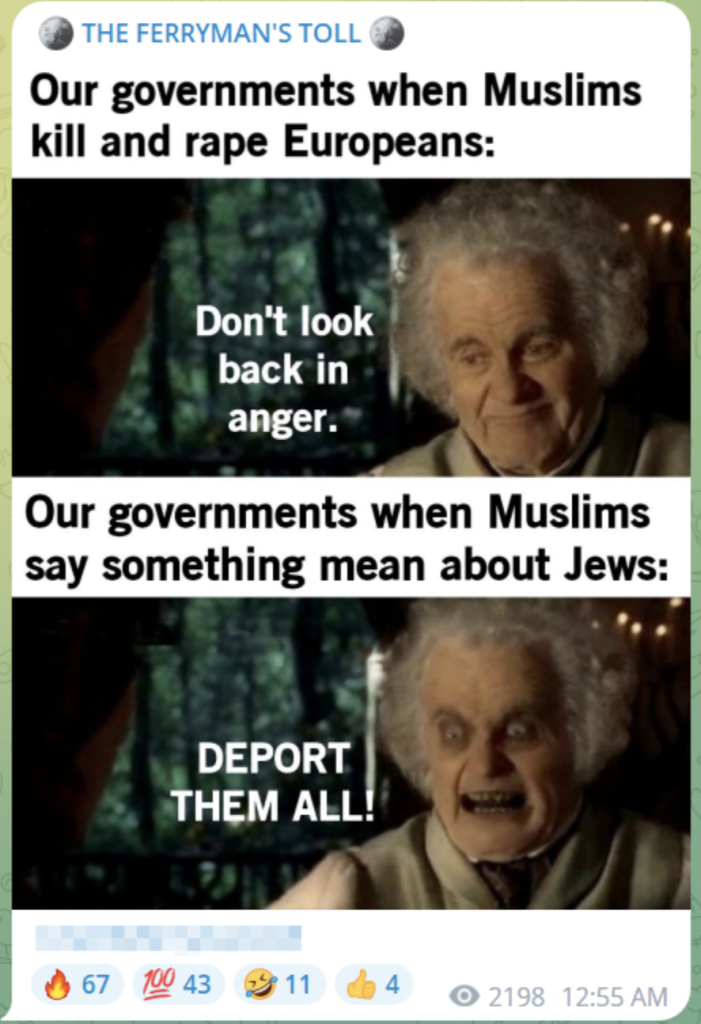
Fig. 4: Meme posted to Alex ‘Ferryman’ Vriend’s Telegram channel.
Experts have warned that exposure to violence in the news places people at risk of desensitisation, rendering the opportunism demonstrated by far-right extremists during this crisis even more alarming. Media narratives and content emerging from the war have given ample opportunities for far-right extremists to platform potentially harmful content with practical uses for radicalising people into violent extremist movements, including online misinformation, disinformation, and violent imagery. In social media posts and live streams since the start of the conflict, Canada’s far-right extremist podcasting circuit has been quick to share extremely graphic footage of dead civilians, often without warning or preface. In a recent panel on the Swedish-American white supremacist program Red Ice TV, Jeremy Mackenzie credited the modern media landscape with changing the opinions of younger generations, saying, “these kids grew up with alternative information. They’re able to do this better.”
An acknowledgement by far-right extremists that the modern media environment is beneficial to them is especially alarming, as uncertainty about Canada’s access to credible information remains in jeopardy. Since June, Meta has blocked news from Canadian Instagram and Facebook users in protest of Canada’s Online News Act despite Canadians’ reliance on news outlets on Facebook to access urgent information. In the wake of widespread misinformation and violent imagery pertaining to the war on major social media platform Twitter/X, further questions about the role of harmful content to the far-right in Canada are warranted.
Replacing Russia-Ukraine War Disagreements
Though quantitative research would be needed to determine which messaging about the ongoing Israel-Palestine war will prevail among Canada’s far-right, some comparisons can be made to their reaction to the Russia-Ukraine war. From the early days of Russia’s invasion of Ukraine, disagreements about the conflict have recurred in far-right extremist spaces.
The ongoing Russia-Ukraine war sparked inspiration in white supremacist circles on both sides of the conflict. Some Canadian white supremacists put their support behind Putin’s extreme anti-LGBTQ+ laws and attacks on democracy. Additionally, as ethno-nationalists, white power movements saw imperial expansionism into new territory by a majority-Caucasian country as a new hope for a white ethnostate. Another variable for the Canadian far-right’s support for Russia is the extent of the influence of Russian neofascist Aleksandr Dugin. Dugin has likely influenced some Canadian fascists, both directly through his writings and indirectly, for example through the writings of prolific Dugin-inspired neo-Nazi Alisher Mukhitdinov (better known as Alexander Slavros).
Conversely, some Canadian neo-Nazis voiced support for Ukraine’s Azov movement, a Nazi-led Ukrainian ultranationalist movement whose civilian battalion was absorbed into the Ukrainian National Guard. Many North American Nazis already saw the Azov movement as a success story in mainstreaming neo-Nazism, as Azov Regiment soldiers and other Ukrainian armed forces members have continued to flaunt Nazi iconography long after the unit’s integration with Ukraine’s official military. Additionally, even Canadian fascists sympathetic to Russia have been seen conflating modern Russia with the legacy of the Soviet Union (despite Russia’s abandonment of Soviet politics long ago) and, as such, may oppose elements of Russian nationalism. Instead, these movements typically tend to celebrate historic Nazis in Ukraine who fought against the Soviet Union, especially those with connections to Canada. One Canadian neo-Nazi group recently propagandised their pilgrimage to an Oakville, Ontario monument to the 14th Waffen Grenadier Division, an SS unit composed of Ukrainian fighters.
Since the invasion of Ukraine, none of these narratives proved to be a unifying one for those on the Canadian far-right. Above all else, the movement is deeply conspiratorial and prone to fall for mis/disinformation that suits pre-existing narratives. Some activists will continue to denounce the Russia-Ukraine war as a Jewish plot, at times relying on the conspiracy theory that the war is secretly an extension of a power struggle started by Jewish Khazars controlling Ukraine’s government.
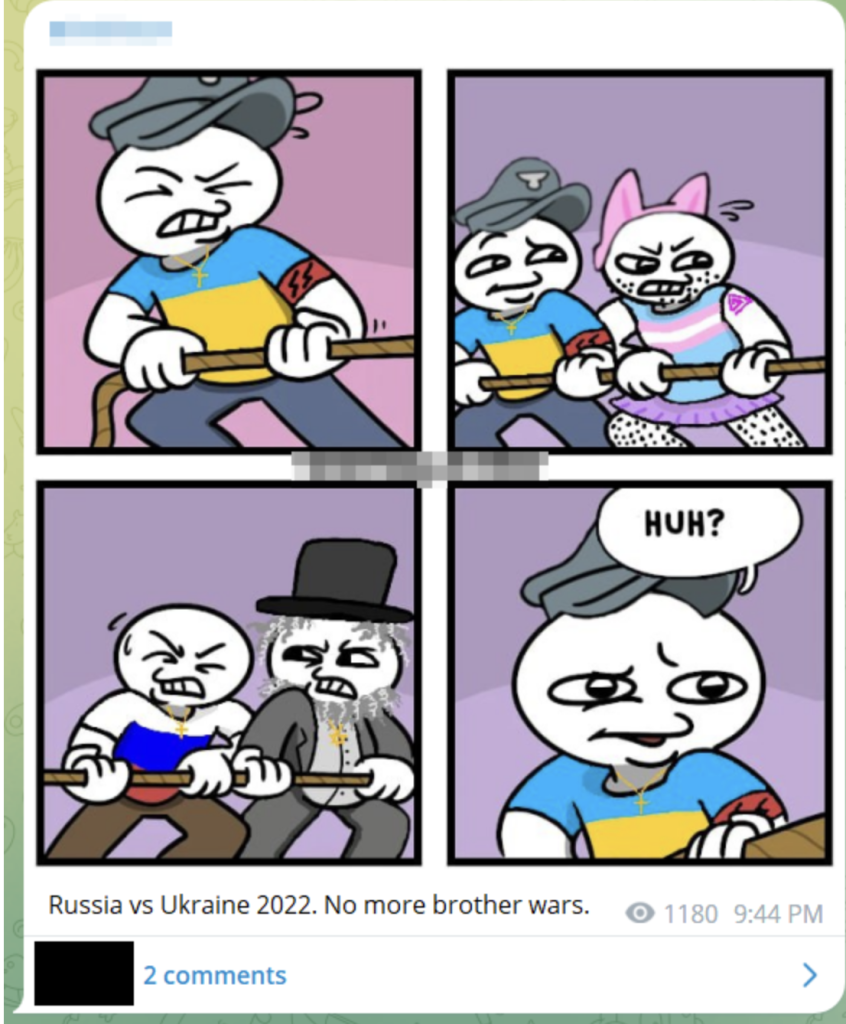
Fig. 5: A Stonetoss webcomic modified by Canadian neo-Nazis.
A considerable number of Canadian far-right activists have also spoken in favour of neutrality in the Russia-Ukraine war, lauding the popular catchphrase “No more brother wars”, a white supremacist expression used to denounce conflicts between countries with primarily Caucasian populations (Fig. 5). Narratives promoted by Canada’s far-right about the Israel-Palestine war have relied on a contrasting view of the people involved to reach the same position: there are no brothers’ in either Palestine or Israel. Therefore, neutrality is a rational position. As one livestreamer put it: “Fight over your dirt patch all you want, leave us out of it.”
Conclusion
The possibility of rampant hateful messaging about the Israel-Palestine war could add further kinds of pressure to an already polarised geopolitical situation in Canada. Though Canada’s far-right is relatively fringe, there is precedent to believe far-right narratives may enter moderate Canadian right-wing politics, as some narratives have done so. A prominent example came earlier this year when a federal byelection in Manitoba was won by a Conservative candidate who capitalised on his far-right opponent Maxime Bernier’s links to the World Economic Forum, which was a boogeyman for the conspiratorial far-right before being adopted by Conservatives. Likewise, Conservative Party of Canada leader Piere Poilievre – who is ahead of Liberal Prime Minister Justin Trudeau in recent polls – has invoked conspiratorial tropes about “globalists” and the World Economic Forum, both of which were used in far-right movements before appearing in the Conservative Party’s messaging.
Therefore, while the content observed in this article comes from extreme far-right spaces, there remains a risk that these narratives may eventually become normalised to a broad audience. Furthermore, xenophobic narratives about foreign conflicts in particular pose a threat to Canada. As first-generation immigrants continue to make up larger portions of the Canadian population and account for virtually all of the continued growth of Canada’s labour sector, sentiments demonising potential refugees and immigrants to Canada risk jeopardising Canada’s culture and economy.
Dan Collen is an Affiliate Member of the Canadian Institute for Far-Right Studies and a researcher at Insight Threat Intelligence. He has worked as an educator and researcher of online hate speech in Canada and is a co-creator of Hatepedia.ca.
